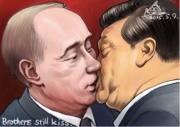|
What is the most powerful flying bug? This poll is closed. |
|||
|---|---|---|---|
| 🦋 |
|
15 | 3.71% |
| 🦇 |
|
115 | 28.47% |
| 🪰 |
|
12 | 2.97% |
| 🐦 |
|
67 | 16.58% |
| dragonfly |
|
94 | 23.27% |
| 🦟 |
|
14 | 3.47% |
| 🐝 |
|
87 | 21.53% |
| Total: | 404 votes | ||
|
PoontifexMacksimus posted:Very good post. The fetishization of technology is inextricable from the fetishization of capital. Capital is dead labour, but imagined as existing separately from (above, really) that mere human activity. In the same way technology is imagined not as tool intrinsic to some process of human and social activity, but as a plug-and-play Platonic form that radiates good results by its mere presence like a magic talisman. When you really get down to it these liberals just loving conceptualize and think wrong.
|
|
|
|

|
| # ? May 25, 2024 01:46 |
|
Orange Devil posted:Yeah but as soon as you allow the logic that one thing is better-off under state control because it avoids perverse incentives, cartels and conspiracies etc etc or even just plain is a core function of the state ensuring its own continuity, you're going to get people asking difficult questions about other things for which it would then be very difficult to argue the same logic does not hold. Like say, utilities and transport infrastructure. Oh yeah, deffo. A major reason why military had a historical pass on that because mercenaries, according to some stuff I recall from political economy Like, once the nation-state comes up, a capitalist looking after their surplus value through procurement contracts and taking every advantage (read: being very competent at what they propose to do), well that looks reaaaaaally bad to everyone. IIRC this has been mentioned as one of the very very rare issues where everyone gets pissed: conservatives, liberals, socialists, reactionaries... Everyone despises mercenaries lmao
|
|
|
|
Second Hand Meat Mouth posted:https://twitter.com/DevanaUkraine/status/1686311993651650562 What, am I supposed to deny three of them now? Seems like too much work...
|
|
|
|
Cuttlefush posted:the warning signs were there Well, yeah, he awarded Bandera and Shukhevych the Hero of Ukraine title. PoontifexMacksimus posted:What, am I supposed to deny three of them now? Seems like too much work... He doesn't know how to deny the three Holodomors! 
SplitSoul has issued a correction as of 16:07 on Aug 1, 2023 |
|
|
|
Then there was the war against the Nazis, in which 10 million Ukrainians died according to official data. Everyone remembers Zhukov's order not to arm the Ukrainians and drive them unarmed first in the ranks, because the more they die, the less they will have to drown in the Dnieper after the war.
|
|
|
|
It’s entirely possible that after the strong start, UAF ends up alongside the ARVN and ANA in the pantheon of US success stories. Anything built now (that Soviet equipment is gone and experienced soldiers and officers too) is built on the foundations of the hilariously corrupt state and hollow institutions. The “NATO trained forces”, as we saw, were trained to defeat the BTG, which itself is a theory that relies entirely on technology overcoming material reality. Their fighting effectiveness was supposed to come from the superior optics and firepower of technologically superior vehicles - which they then drove into minefields. Their “superior small unit leadership” was revealed to be an app. So, what new military are they going to build with guys literally taken off the streets at gunpoint?
|
|
|
|
Question for Zodium: Has cybernetic capitalism killed the nation-state? Or is the ethno-nationalism that is the sole motivating factor left (given that everything else is just about make money for your betters also gently caress you) inside the cybernetic capitalist system its largest contradiction? Like what's the theory here? And has anyone got any bright ideas about what happens after the fascists inevitably win their elections but, after continuing neoliberal policy but with even more racism and maybe some ethnic cleansing and genocide, the lives of the white hoi polloi in the imperial core still don't materially improve?
|
|
|
|
Orange Devil posted:The best part is this kind of poo poo always gets sold by the media as if this means it is the largest defense purchase, in terms of being a huge expansion to the military. The key bullshit word here would be "capability", as in "biggest expansion of military capability", where the assumption just is that more dollars = more capable = more expansion. Military strength measured like Silicon Valley valuations
|
|
|
|
surely warfare will be completely automated before it gets to that point
|
|
|
Second Hand Meat Mouth posted:https://twitter.com/DevanaUkraine/status/1686311993651650562 Commit 3 holodomors labelled 1, 3, and 4,
|
|
|
|
|
Hatebag posted:Commit 3 holodomors labelled 1, 3, and 4, lol
|
|
|
|
someone edit the [hole left by the Christian dark ages] graph
|
|
|
|
Frosted Flake posted:Which is how it turned out the miraculous NATO standard military created in just a few short years really just meant apps. They thought they could skip actual material reality - training, equipment, doctrine, institutions - with technology. OF-9 Senior Theatre AI Prompt Engineer
|
|
|
|
Orange Devil posted:And has anyone got any bright ideas about what happens after the fascists inevitably win their elections but, after continuing neoliberal policy but with even more racism and maybe some ethnic cleansing and genocide, the lives of the white hoi polloi in the imperial core still don't materially improve? what was life like for romans during the fall of the roman empire?
|
|
|
|
Orange Devil posted:Question for Zodium: The former: personally, I disagree. I think Zodium can elaborate far better than me on the peculiar of the cybernetics, but regarding contemporary Marxism, the nation-state is a much tougher beast than present-day dominant capital gives it credit for. Especially the revolutionary nation-state, which forms perhaps the most successful counter to it As for the latter, I do agree with some Marxist positions that fascist degeneration is consequential from imperialism and colonialism, but not an end-state. As capital eats itself in a former empire, it blasts pieces of its own walls. This is where the new possibilities will lie
|
|
|
|
All this criticism of Ukrainian war effort stems from the mistaken assumption that they're trying to win this war. From observing both sides it should become apparent that nobody is trying to win this war. At best they're both simply trying to not lose right now.
|
|
|
|
Halser posted:what was life like for romans during the fall of the roman empire? How many pages do you want?
|
|
|
|
Frosted Flake posted:How many pages do you want? I suggest keeping it under 16222 lines, but anything under that is fine by me
|
|
|
|
Halser posted:I suggest keeping it under 16222 lines, but anything under that is fine by me lol
|
|
|
|
dead gay comedy forums posted:but since it is ideology, the people there don't realize they are taking out the copper wiring, instead they think they are reforming the building and making it better yep. neoliberalism is the ideology that cybernetic capitalism predominantly produces, not the cause of it. neoliberals could no more think to make an exemption from it for this or that domain than they could think to exempt this or that from gravity unless they were somehow to find themselves outside its core by illness or other misfortune. edit: ok lmfao I should have read the whole thread and will do a better reply later Zodium has issued a correction as of 16:20 on Aug 1, 2023 |
|
|
|
Frosted Flake posted:Is there a thread to post about Mali, Burkina Faso and Guinea pledging to defend Niger? no one cares OP thats why we have this thread and not one about the ethopia/eritrea war or the civil war in sudan
|
|
|
|
Halser posted:what was life like for romans during the fall of the roman empire? Frosted Flake posted:My first undergraduate class on Late Antiquity, so way before the specialized material or seminars or anything, the professor introduced it by saying that the Völkerwanderung was just like the Syrian refugees, and that the Muslims in Europe, like the Goths, would turn on their benevolent hosts for no reason (and yes, this is how he later taught the battle of Adrianople too). That was day one, and was like that for the whole class. He mentioned Islam as the destabilizing force in Late Antiquity in the first lecture, despite... well more stuff than I can get to here, but Greg Fisher has written some really cool stuff on that. In terms of presenting periodization to the class... mentioning Islam before the Crisis of the Third Century is pathological.
|
|
|
|
AnimeIsTrash posted:no one cares OP We have this thread because a bunch of people whined and mods kicked us out of the eurasia thread. Lostconfused has issued a correction as of 16:39 on Aug 1, 2023 |
|
|
|
Atrocious Joe posted:https://twitter.com/sentdefender/status/1686192339428003841?s=20 lol ecowas hasnt threatened any of the other coups in the region, guess that niger is more valuable to the west if theyre trying to pressure them into doing things
|
|
|
|
broke: double genocide theory woke: triple holodomor theory
|
|
|
|
Hatebag posted:Commit 3 holodomors labelled 1, 3, and 4, imagine 4 holodomors on the edge of a cliff
|
|
|
|
one of the best posts ever hahaha. done on a iPhone.
|
|
|
|
I actually wanted to quote that because I recall really enjoying the one book I read by Chris Wickham so I should check out more, but on Greg Fisher a recent review I read was quite mixed (https://bmcr.brynmawr.edu/2022/2022.01.38/), so I wasn't sure how enthusiastic to be.
|
|
|
|
Weka posted:Oh of course not, just mildly interesting thread about noted weirdo subject of the thread Gonzalo Lira well, it was the thread that FF could not open in twitter, not a random link
|
|
|
|
AnimeIsTrash posted:lol ecowas hasnt threatened any of the other coups in the region, guess that niger is more valuable to the west if theyre trying to pressure them into doing things by the way, i personally feel like it's kinda on the nose that some economic cooperation organization apparently has given itself the authority to literally start wars against its own member states when they fall out of line with the neoliberal world order
|
|
|
|
You mean the rules based international order?
|
|
|
|
did i stutter?
|
|
|
|
euphronius posted:one of the best posts ever hahaha. done on a iPhone. still hard to parse that bit. Amazing. so, I guess we can transform the original question into "what groups will have the opportunity to offer better conditions when the US cracks?"
|
|
|
|
PoontifexMacksimus posted:... Looking forward to when TSMC factories get blown up by mystery yachts and everybody has to go back to use 4 year old iphones.
|
|
|
|
Well see there you have another problem. When Constantine allied Church and State, it fundamentally changed how dissent was managed within Christianity. Before there had been church councils of course, and armed mobs on the streets, and debates between bishops, of course, but the limits to these always meant a certain amount of diversity was assumed to exist. Mostly in the east, where Christianization was early and rapid, which meant it was not a state project and before many key doctrines had been worked out (before Nicaea, for example), which of course meant that it was not uniform or regulated. Okay, well the Roman Empire fundamentally required regulation, it was a state. Constantine set the precedent that the state oversaw religious conformity by directing Church councils. That created a trap for Eastern emperors that would last until the fall of Constantinople, because heresy was now an issue of state security. Of course they cracked down violently, using the tools of the state to stamp this out, but beyond spilling rivers of blood over centuries, it also created a problem. It didn’t work. It was a more powerful tool than the earlier debates, councils and riots, but heresy could never be entirely eliminated because it is an internal belief and not just a set of practices. As soon as the wave of state interest and violence passed, and as the Roman state was always busy elsewhere it was just a matter of time in any one area, it would pop back up again. Not only would it reemerge, but understandably, the group, which may has literally only diverged in their understanding on say, if Christ existed before the Holy Spirit or something, were now Public Enemies and so hated the state. This means that as soon as the Persians, and later Arabs, came through, they’re defecting. Live under Constantinople who will kill you if they get the chance, or pay a tax to the Muslims? Easy choice. In fact, this whole conflict meant that Muslims didn’t feel any more different than any Christian group. I mean, you could hardly talk about one being the same religion as you because of certain theological points and the other not. Even if the theological differences on the nature of Christ were on paper greater with Islam, they weren’t going to kill you over them, so again, why would that seem like a more alien religion? Alright, so state violence trying to suppress an ideology, to prevent the emergence of alternatives you could say, weakens the Empire - even though they are not opposed to the Empire, as a state, per se. Well, what happens when organized groups opposed to capitalism emerge in western states? We’ll use the United States. They are not challenging the status of the Emperor, you know constitution, all of that Americana, they are not laying claim to territory or trying to assume functions of the state. They are merely trying to oppose capitalism - or even exist outside of capitalism - within the borders of the state. Let’s say they’re giving poor kids breakfast. They are treated as a national security risk and cracked down on by the full power of the state. Any groups that offer an alternative to capitalism are perceived more or less as heretics. When they demonstrate alternative social systems are possible, they are suppressed. Alright, so here’s the hope spot. As American capitalism dissolves all social structures, all elements of social life, in the pursuit of profit, a situation that is not only unpopular but the ultimate expression of which is as much of an impossibility as total religious conformity, they’re trapped too. See, total atomization fundamentally goes against human nature. People will resist it, and organize alternatives - even if they don’t see this as resistance against the state. The state isn’t offering alternatives, it has to defend atomized neoliberal hell, so what’s perceived as a threat, as neoliberalism progresses, would seem to extend to nearly all social life. Well if they turn people who “want food” and “want to have families” into enemies of the state to defend neoliberalism, they’re going to face the same ultimate problem where people’s loyalties will shift to an alternative. As much as Americans still shake in their boots at Chinese Communism, when they see that people living under the CCP can have kids, and have employment, pensions, whatever, and trying to have those things in America unleashes state violence on them, they are eventually going to realize that their lives are better under the alternative, and since the state has tied itself to a system they hate, their loyalty to the state disappears too.
|
|
|
|
Niger must surrender to the civilizing forces
|
|
|
|
Cookie Cutter posted:flyers of the rainbow flag (nothing wrong with that in itself ofc)
|
|
|
|
I loving love late antiquity. More late antiquity posting.
|
|
|
|
Second Hand Meat Mouth posted:https://twitter.com/DevanaUkraine/status/1686311993651650562 The genocide denial got two holodomors higher!
|
|
|
|

|
| # ? May 25, 2024 01:46 |
|
how many nazis can dance on the head of a rainbow raytheon float
|
|
|


































